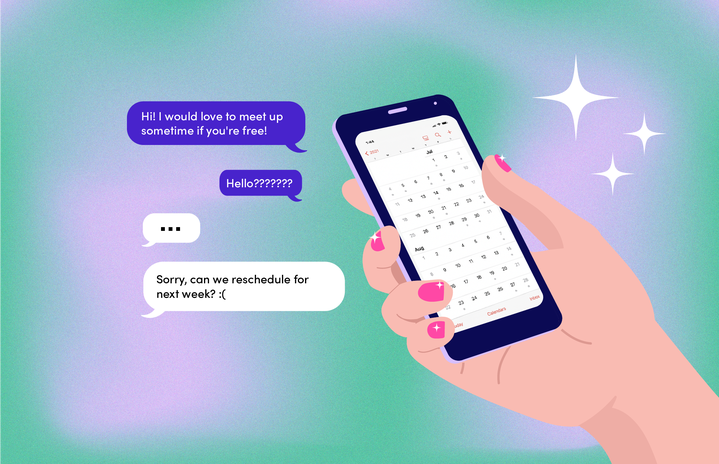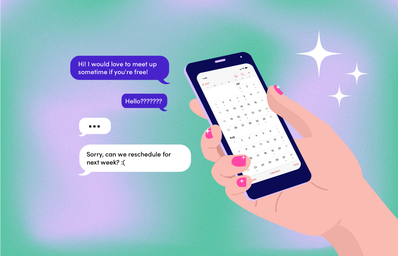Since graduating college, I’ve felt a bit like I did at the beginning of the pandemic in 2020: stuck at home, missing my friends, and not really sure how to tend to the ache. This loneliness was supposed to get easier as the pandemic wound down, either through adjustment to the new normal or through the slow but sure return to pre-pandemic socialization, but for me, it feels like it’s just beginning.
This was the most bitter pill to swallow upon graduation: Adult friendship requires effort, especially post-grad. I understand how that sounds — I’m not saying that I didn’t put effort into my relationships during college, but you have to admit there’s a certain ease to knowing that your friends live in the same space and run on the same general schedule as you. You know when the dining halls will be open and what their favorite one is, and you can rush out the door five minutes before you have to meet them, because you have a designated meeting spot right in your building lobby. There’s no anxiety over not knowing when you’ll run into them next, because they’re always at your club meetings on Monday nights and taking up the corner table in the campus coffee shop on Sunday mornings. But once you’ve turned in your dorm keys and given your final goodbye hugs, that anxiety not only returns, but becomes all-consuming.
I attended college in New York, and chose to remain in the city post-grad for a number of reasons, but I have to admit that one of the main appeals was being able to keep in touch with other alums. I expected to have the same spontaneous run-ins that colored my college years (remote semesters in 2020 notwithstanding, of course). But living in the same city as a friend is not the same as living down the hall or across the quad from them — I now have to factor in at least half an hour on the subway, planning at least a week in advance, and the loss of my ability to guess their schedule based on my peripheral knowledge of their club meetings and exams. This isn’t even to mention the friends that move away after graduation; while scheduling FaceTime dates with my old roommate has been fun in its own right, it doesn’t exactly replace our twice-weekly dinners in the lounge or the times I would randomly run into her on my way to or from class.
When did making plans to hang out start to feel like trying to network on LinkedIn?
Don’t get me wrong: The new purposeful steps I have to make to keep my friends are all small sacrifices in my book. But coming to terms with the fact that not every friendship is going to survive even these tiniest of road bumps has led me to the realization that my social network will undertake a massive shrinking the older I get.
Now, I feel unmoored in my studio apartment without roommates to commiserate with, wondering if anyone else feels the same way as me or if I truly am alone in this. The worst part is the unbidden guilt of bothering someone when I send that Hey, are you busy next weekend? text; no one wants to be the forgotten, unwanted friend of an era gone by. I find myself on edge waiting for replies, wondering if I came on too strong, if I didn’t give enough advance notice. When did making plans to hang out start to feel like trying to network on LinkedIn?
I know that loneliness due to the pandemic, or even due to graduation, isn’t a new or exciting topic. Young people especially are suffering from pandemic loneliness, with a 2021 Harvard study confirming that loneliness has risen during the pandemic — 61% of young adults feel “serious loneliness,” according to the results. Post-grad depression is also not new, though it isn’t talked about nearly as much as it should be — according to Cosmopolitan in 2019, 49% of respondents to a survey of over 300 graduates by the City Mental Health Alliance reported declining mental health after graduation, and 40% said they felt socially isolated. This can carry over into our careers, too: Even as the working world opens up for Gen Z post-grads, remote work might be here to stay. While there are benefits of a continued remote business model in the future of the workplace, as the Atlantic points out, remote work has a strong correlation with increased loneliness.
Almost half of my college years were spent peering into a webcam and seeing nothing but empty stares in return.
Recent grads have found ourselves in a unique situation, at the intersection of these factors of loneliness. We’re supposed to be entering the great, wide world right now and spreading our wings — except the world isn’t quite ready for us, and we weren’t given enough time to be ready for it, either. Almost half of my college years were spent peering into a webcam and seeing nothing but empty stares in return. Now it seems that even with things returning to normal, webcams and disconnections might be a large part of my social future anyway.
I’m not sure that this effort ever starts to feel more natural, or becomes easier. Hell, I don’t even know how to go about making new friends — I’m too exhausted trying to keep up with the ones I already have. There are moments when that exhaustion is more than worth it, though. While traveling to visit family recently, I made time to meet up with a friend in the area who had already graduated. We were able to pick up right where we left off. I also felt way less weird about reaching out to a high school friend I hadn’t seen in years when I saw she was in my city for the weekend. Even my FaceTime dates, as infrequent and riddled with poor connection as they are, act as a soothing balm to the fatigue of a long work week.
I’m learning that sometimes growth in friendships happens by falling apart, and then back together again. Learning to be okay on my own is teaching me not to waste time on superficial relationships, and to trust in the people that I know will always be there for me, no matter how far away. I guess this is just part of being an adult: you have to learn to put effort toward the people in your life that matter, because if they’re meant to stay, they’ll return that energy right back to you. Everyone is dealing with exiting the pandemic in the best ways they can — it doesn’t hurt to be a little more attentive to our friends.


